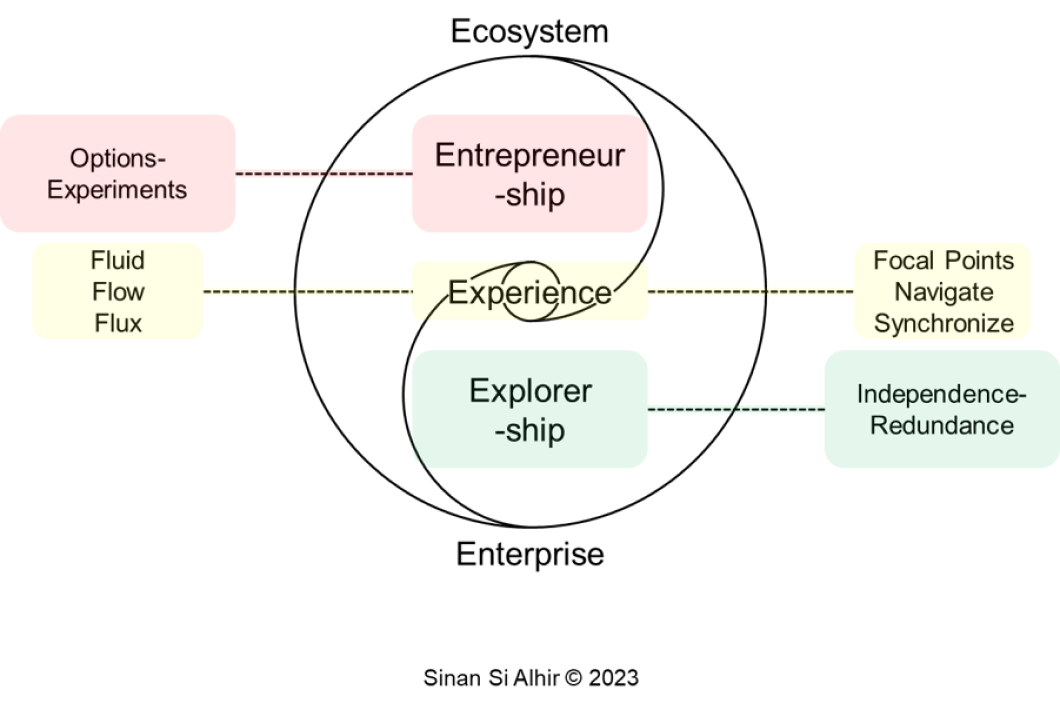The Edge: Harness the Paradoxical and Flourish in the Age of Entanglement
This assessment focuses on individual agility, resilience, and antifragility. This may be leveraged by individuals, team members, team and enterprise leaders, and ecosystem leaders.
If recent years have proven anything, it is that reality is too wild, and we are too tame. Given that we can't domesticate reality, we must rewild ourselves.
This involves embracing the edge --- leveraging ecosystem thinking to cultivate individuals, teams, enterprises, and ecosystems that embody agility, resilience, and antifragility --- to harness (beyond manage and navigate) the paradoxical and flourish (not only survive but thrive) in the age of entanglement.
Proven
Leverage proven practice-informed theory and theory-driven practice, beyond peer-reviewed research, to quickly identify where attention is needed and initiate action to help.
Insightful
Gain insights expeditiously and perform analysis at the individual, team, enterprise, and ecosystem levels.
Impactful
Give individuals, teams, enterprises, and ecosystems a voice to express where a meaningful difference is needed.
Comparative
Benchmark the level of agility, resilience, and antifragility across individuals, teams, an enterprise, and an ecosystem against other enterprises and ecosystems.
Practice-informed Theory and Theory-driven Practice
The best foundation for success involves integrating practice-informed theory and theory-driven practice into a proven comprehensive framework, combining over four decades of work.
Individual Agility, Resilience, and Antifragility
Agility, resilience, and antifragility are “muscle fibers” constituting a “complexity muscle,” which is exercised and improved using stress.
Agility involves reactively embracing stress by adapting.Resilience involves reactively addressing the impact of stress by recovering.Antifragility involves proactively seeking stress and evolving.
Insights, Guidance, and Advice for Impact
The best foundation for success involves integrating practice-informed theory and theory-driven practice into a proven comprehensive framework, combining over four decades of work.
Ecosystem Thinking
How do we harness, beyond manage and navigate, unprecedented levels of turbulence? How do we flourish, not only survive but thrive, in a world where we can only expect the unexpected?
Ecosystem thinking offers a worldview composed of framing pillars, core concepts, foundational principles, and contextual practices.
The framing pillars (5 Es / 5 Cs) of ecosystems express ecosystem thinking conceptually.
An ecosystem is a configuration of stakeholders in continuous reconfiguration.
Entrepreneur-ship involves congruence among stakeholders.
Explorer-ship involves connection among stakeholders.
An enterprise involves coherence among stakeholders.
Experience involves continuous calibration with reality.
The foundational principles of ecosystems include entrepreneur-ship using options & experiments and explorer-ship using independence and redundancy.
The contextual practices of ecosystems express ecosystem thinking operationally in a specific context; that is, expressing foundational principles using core concepts in a specific context to create specific practices.

